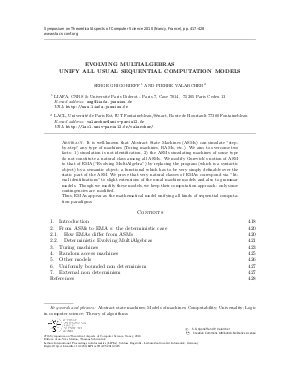Evolving Multialgebras Unify All Usual Sequential Computation Models
Authors Serge Grigorieff, Pierre Valarcher
-
Part of:
Volume:
27th International Symposium on Theoretical Aspects of Computer Science (STACS 2010)
Part of: Series: Leibniz International Proceedings in Informatics (LIPIcs)
Part of: Conference: Symposium on Theoretical Aspects of Computer Science (STACS) - License:
 Creative Commons Attribution-NoDerivs 3.0 Unported license
Creative Commons Attribution-NoDerivs 3.0 Unported license
- Publication Date: 2010-03-09
File

PDF
LIPIcs.STACS.2010.2473.pdf
- Filesize: 317 kB
- 12 pages
Document Identifiers
Subject Classification
Keywords
- Abstract state machines
- Models of machines
- Computability
- Universality
- Logic in computer science
- Theory of algorithms
Metrics
- Access Statistics
-
Total Accesses (updated on a weekly basis)
0PDF Downloads0Metadata Views
Abstract
It is well-known that Abstract State Machines (ASMs) can simulate ``step-by-step" any type of machines (Turing machines, RAMs, etc.). We aim to overcome two facts: 1) simulation is not identification, 2) the ASMs simulating machines of some type do not constitute a natural class among all ASMs. We modify Gurevich's notion of ASM to that of EMA (``Evolving MultiAlgebra") by replacing the program (which is a syntactic object) by a semantic object: a functional which has to be very simply definable over the static part of the ASM. We prove that very natural classes of EMAs correspond via ``literal identifications'' to slight extensions of the usual machine models and also to grammar models. Though we modify these models,we keep their computation approach: only some contingencies are modified. Thus, EMAs appear as the mathematical model unifying all kinds of sequential computation paradigms.
Cite As Get BibTex
Serge Grigorieff and Pierre Valarcher. Evolving Multialgebras Unify All Usual Sequential Computation Models. In 27th International Symposium on Theoretical Aspects of Computer Science. Leibniz International Proceedings in Informatics (LIPIcs), Volume 5, pp. 417-428, Schloss Dagstuhl – Leibniz-Zentrum für Informatik (2010)
https://doi.org/10.4230/LIPIcs.STACS.2010.2473
BibTex
@InProceedings{grigorieff_et_al:LIPIcs.STACS.2010.2473,
author = {Grigorieff, Serge and Valarcher, Pierre},
title = {{Evolving Multialgebras Unify All Usual Sequential Computation Models}},
booktitle = {27th International Symposium on Theoretical Aspects of Computer Science},
pages = {417--428},
series = {Leibniz International Proceedings in Informatics (LIPIcs)},
ISBN = {978-3-939897-16-3},
ISSN = {1868-8969},
year = {2010},
volume = {5},
editor = {Marion, Jean-Yves and Schwentick, Thomas},
publisher = {Schloss Dagstuhl -- Leibniz-Zentrum f{\"u}r Informatik},
address = {Dagstuhl, Germany},
URL = {https://drops.dagstuhl.de/entities/document/10.4230/LIPIcs.STACS.2010.2473},
URN = {urn:nbn:de:0030-drops-24737},
doi = {10.4230/LIPIcs.STACS.2010.2473},
annote = {Keywords: Abstract state machines, Models of machines, Computability, Universality, Logic in computer science, Theory of algorithms}
}
